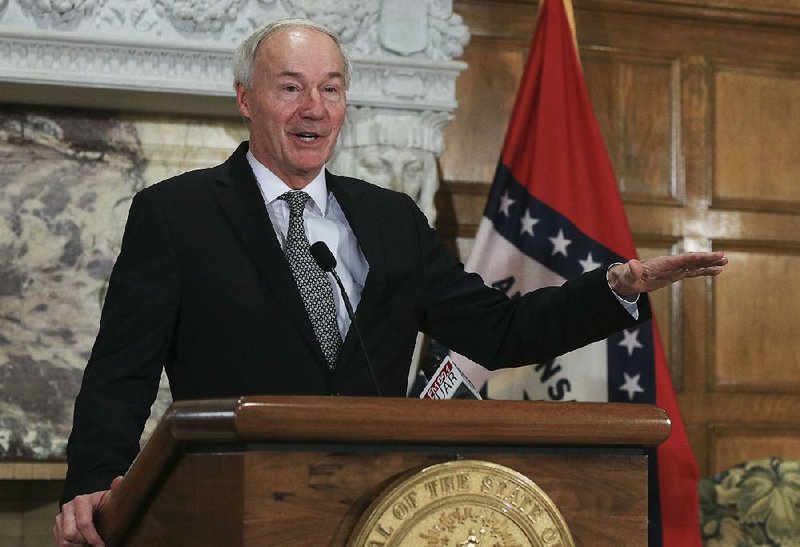Gov. Asa Hutchinson said Monday the corruption-tainted General Improvement Fund that state lawmakers controlled is history, but he held out the possibility of using competitive grants administered by the executive branch to help "communities in terms of their unique needs."
The governor's remarks came amid the federal corruption trial of former state Sen. Jon Woods. The Springdale Republican was indicted in March 2017 in a kickback scheme involving General Improvement Fund grants issued in 2013 and 2014. Randell Shelton, a consultant, and Oren Paris III, former president of Ecclesia College in Springdale, also were indicted.
Hutchinson spoke at a lunchtime meeting at the Metroplan Board of Directors' annual retreat, held this year in Hot Springs Village. Taking questions from the audience after his remarks, Hutchinson fielded the last one from Guy Mayor Sammy Higdon.
"GIF grant money -- is there any discussion that it might be put back in effect or is there any way we can figure out how to do it where it don't get squandered?" the mayor asked.
The governor didn't equivocate.
"GIF money is history and is no longer and is not going to happen," Hutchinson said. "Period."
It's been a difficult program to kill. Mike Wilson, a former Democratic 12-term state representative, has sued his former colleagues three times over the way they allocated state funds to the General Improvement Fund, which holds the state's surplus tax revenue and interest income. Each time, Wilson has prevailed.
In the most recent case, the Arkansas Supreme Court ruled in October 2017, that the lawmakers' method of allocating money to the grant program was too vague to satisfy requirements in the Arkansas Constitution that each item of legislative spending be distinctly described.
His 2016 lawsuit challenged the legality of the way lawmakers had come to direct improvement fund monies to support a statewide grant program that is intended to promote economic development.
Wilson previously won a landmark Supreme Court decision barring lawmakers from personally directing how money from the improvement fund is used.
But Hutchinson said the possibility of replacing the General Improvement Fund grants controlled by the Legislature with competitive grants administered by the executive branch is being studied.
"Now, I do believe that there's ways you can have competitive grants that help our communities in terms of their unique needs that's not legislatively directed but that is competitively looked at and awarded," Hutchinson said. "So I think that is something we can continue to talk about and look at because I recognize the need that happens in our communities that you'd like to be able to have the opportunity to apply for grants."
The state already has a program in place that the governor said he sees as a model. In his remarks, Hutchinson referred to it as the Rural Development Grant program, but he actually was referring to the Rural Community Grant program, which is administered by the rural services division of the Arkansas Economic Development Commission.
He also mentioned cities with populations of less than 2,500 were eligible for the grants. Cities with populations of less than 3,000 are actually eligible for the grants, according to the program's website.
Under the program, those cities, as well as unincorporated areas, are eligible for up to $15,000 in matching money. The applicants must provide half of the project's costs as a match, either in in-kind labor, in-kind materials or cash.
The projects included some, but not all, of the same type awarded under the General Improvement Fund program.
"Communities in the past have received funding for baseball/softball fields, community centers, walking tracks, park and playground equipment, pavilions, picnic tables, and library shelving," according to an online summary of the grant program.
"Fire departments have received funding for new fire stations, additional bays for existing stations, turn-out gear, communications equipment, fire trucks, ... extrication equipment and brush trucks."
The deadline to apply for the current funding cycle ended last month. The rural services division will begin accepting applications for the next round in August.
Funding for the program averages around $625,000 a year, according to Brandi Hinkle, the spokesman for the Arkansas Economic Development Commission. The commission awarded 58 grants totaling $622,089.79 in the fiscal year that ended June 30, 2017, she said. That equates to a grant award averaging $10,725.68.
"We have rural development grants that are eligible for cities of less than 2,500," Hutchinson said. "So you have that access to put some more money simply into that to help those cities and then you'd have to create something new if you want to have any kind of grant program that is competitive for cities that would be above 2,500.
"So we're looking at that. But GIF is over."
RELATED ARTICLE
http://www.arkansas…">Witness: Grants poorly tracked
A Section on 04/17/2018

